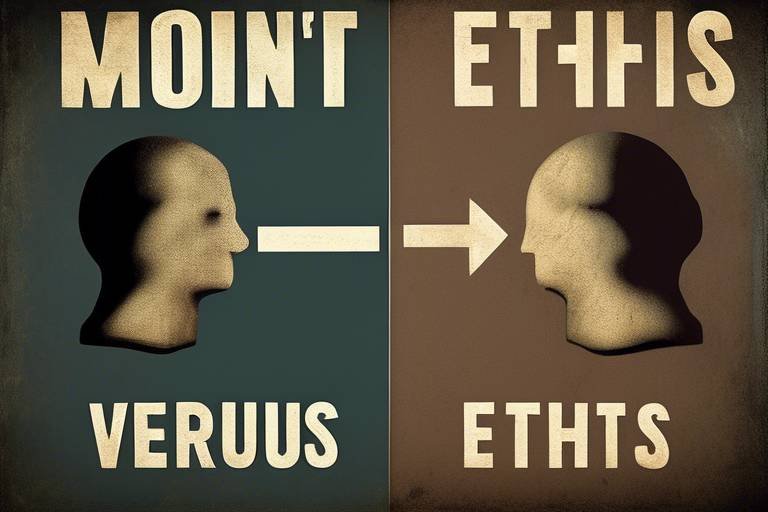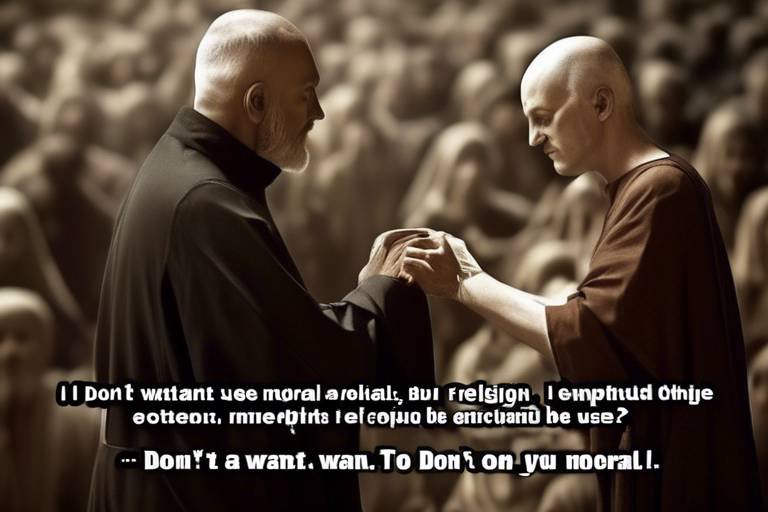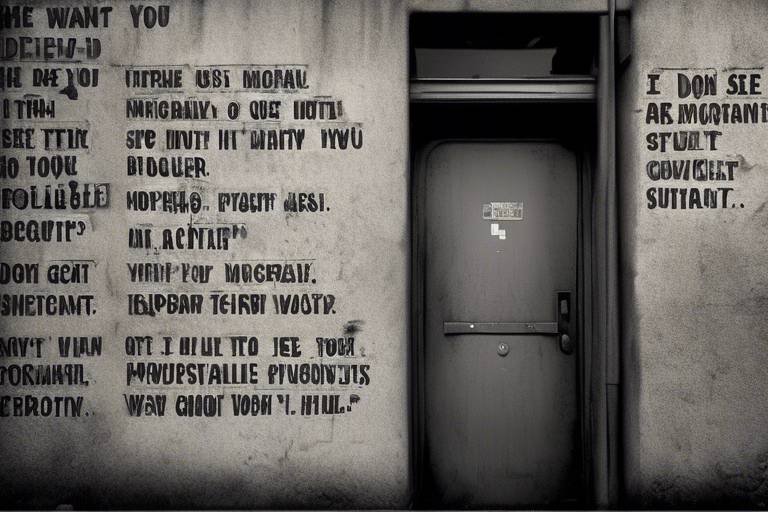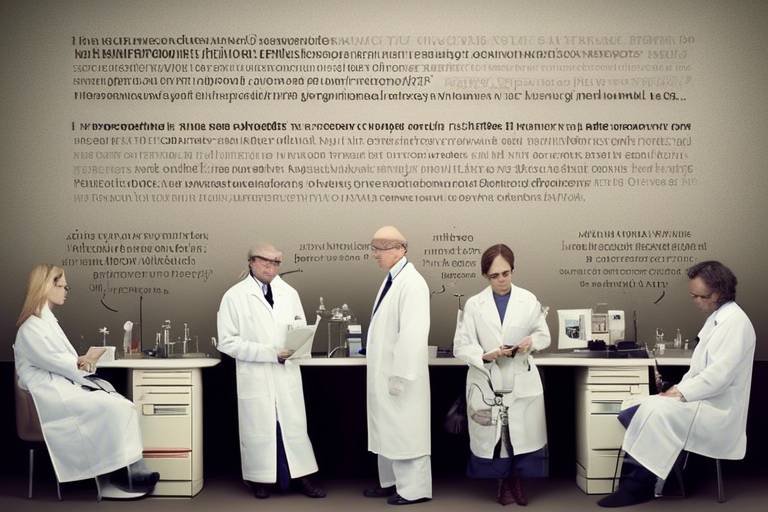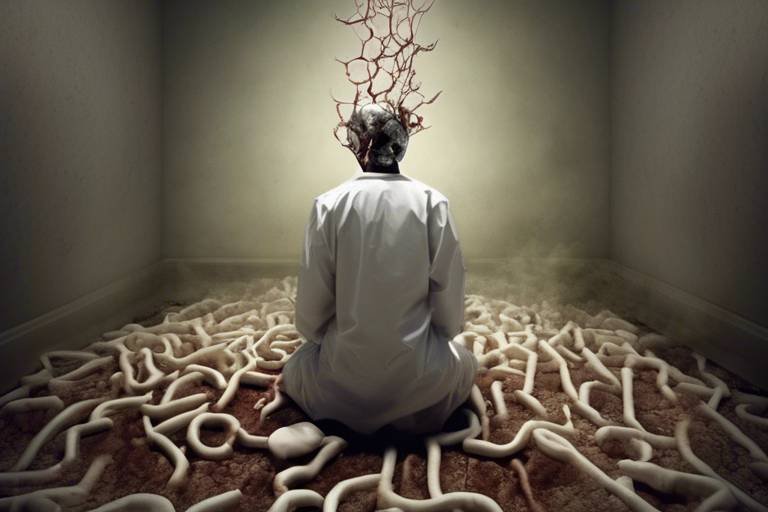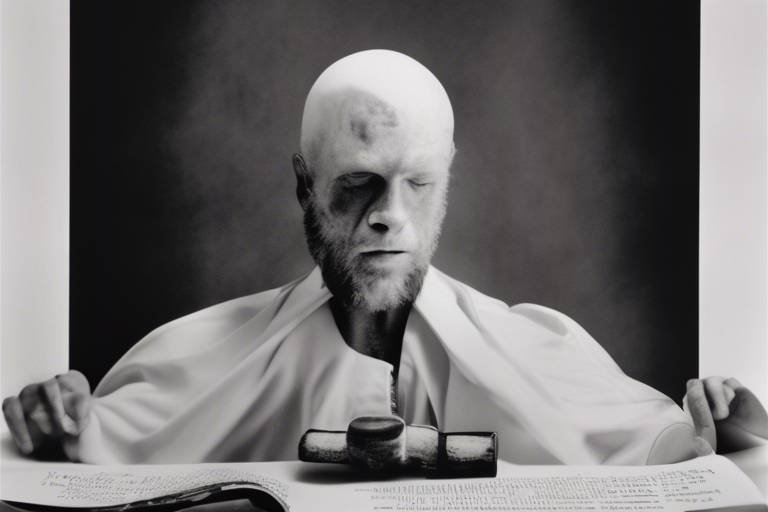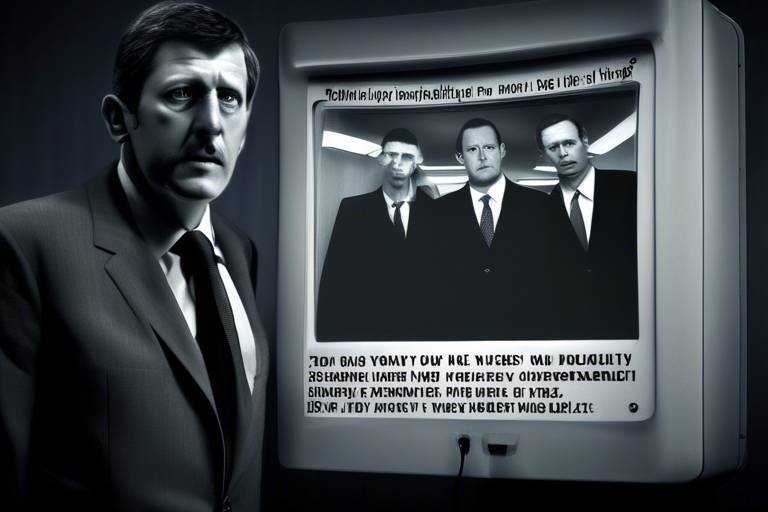The Morals Versus Ethics Debate - A Philosophical Analysis
This article explores the intricate distinctions and overlaps between morals and ethics, highlighting their significance in philosophical discourse and real-world applications. It aims to clarify the ongoing debate surrounding these concepts. Understanding the difference between morals and ethics is not just an academic exercise; it has real-world implications that affect our daily decisions and interactions. Imagine navigating through life without a compass—this is how many people feel when they are unsure of their moral and ethical standings. So, let's dive deeper into this captivating topic!
Morals refer to personal principles that govern an individual's behavior, often influenced by cultural, religious, and societal norms. Essentially, morals are the inner compass that guides us in determining what is right and wrong on a personal level. For instance, one might feel that honesty is a moral obligation, shaped by their upbringing or religious teachings. This section delves into the foundational aspects of moral beliefs and their implications for personal conduct. It's important to recognize that while morals are deeply personal, they are not formed in a vacuum. They are a product of our environment, experiences, and the people we interact with.
In contrast to morals, ethics pertains to the systematic study of what is right and wrong in a broader context. Ethics takes a step back to analyze moral principles and frameworks, providing a structured approach to understanding human behavior. This section examines the philosophical frameworks that shape ethical theories and practices. Think of ethics as the rules of the game, while morals are the individual players' strategies. Ethics helps us navigate complex situations where moral beliefs may clash, offering a more objective lens through which to view our choices.
Examining historical viewpoints on morality reveals how societal changes have influenced moral standards over time. Key philosophers, such as Aristotle and Kant, have significantly contributed to our understanding of moral principles. For instance, Aristotle emphasized the importance of virtue and character, while Kant focused on duty and the categorical imperative. This section discusses their contributions and how their ideas have shaped our contemporary views on morality. The evolution of moral thought reflects the dynamic nature of society itself, as values shift and adapt to new challenges and contexts.
Religious beliefs play a crucial role in shaping moral values. Different religions provide unique frameworks for understanding morality, often rooted in sacred texts and teachings. This subsection explores how various religions define morality and the impact of these definitions on followers' behavior. For example, in Christianity, the Ten Commandments serve as a moral guide, while Buddhism emphasizes compassion and non-harm. The diversity of religious perspectives on morality highlights the complexity of human beliefs and the challenges of finding common ground in a pluralistic society.
Morality varies significantly across cultures, influenced by historical, social, and environmental factors. This subsection investigates how cultural contexts shape moral beliefs and the challenges of navigating these differences in a globalized world. For instance, what is considered morally acceptable in one culture may be frowned upon in another. This cultural relativity raises important questions: How do we respect diverse moral perspectives while upholding universal ethical standards? The interplay of culture and morality is a fascinating and often contentious topic that invites us to broaden our understanding of the human experience.
Different ethical theories provide frameworks for evaluating actions and decisions. This section outlines major ethical theories, including utilitarianism, deontology, and virtue ethics, highlighting their unique approaches to moral dilemmas. For example, utilitarianism focuses on the greatest good for the greatest number, while deontology emphasizes adherence to rules and duties. Virtue ethics, on the other hand, centers on the character of the moral agent. Each theory offers valuable insights, but they can also lead to conflicting conclusions. Understanding these theories equips us with the tools to navigate the complex landscape of moral and ethical decision-making.
Morals and ethics often intersect, leading to complex discussions about right and wrong. This section analyzes how personal morals influence ethical decision-making and the implications of this relationship. For instance, an individual's moral belief in honesty may conflict with an ethical obligation to protect someone's feelings. The interplay between personal morals and broader ethical standards can create tension, prompting us to reflect on our values and choices. It's a dance of sorts, where each step requires careful consideration and balance.
Real-world case studies illustrate the interplay between morals and ethics. This section presents examples that highlight the challenges individuals face when aligning personal beliefs with ethical standards. Consider a healthcare professional who must decide whether to disclose a patient's confidential information to prevent harm to others. This scenario encapsulates the struggle between personal morals and professional ethics, showcasing the complexity of real-life decision-making.
Modern society presents new moral and ethical dilemmas, such as technology's impact on privacy and human rights. This section addresses these contemporary challenges and the ongoing debate they inspire. As we navigate an increasingly digital world, questions arise about the morality of surveillance, data collection, and artificial intelligence. How do we ensure that our ethical frameworks adapt to these rapid changes? Engaging with these issues is crucial for fostering a just and equitable society.
- What is the main difference between morals and ethics?
Morals are personal beliefs about right and wrong, while ethics are systematic principles that guide behavior in a broader context. - Can morals change over time?
Yes, morals can evolve based on cultural, societal, and personal experiences. - How do ethics influence decision-making?
Ethics provide a framework for evaluating actions and choices, helping individuals navigate complex moral dilemmas.

The Definition of Morals
Morals are the personal principles that serve as a compass for an individual's behavior, guiding them in distinguishing between right and wrong. These principles are often deeply rooted in cultural, religious, and societal norms, making them incredibly personal and subjective. Imagine morals as the internal GPS that helps navigate the complex landscape of human interaction, where each twist and turn can lead to vastly different outcomes based on personal beliefs.
The foundation of moral beliefs can be traced back to various sources, including family upbringing, educational experiences, and the broader cultural context. For instance, a person raised in a community that values honesty may develop a strong moral stance against deceit, while someone from a different background might prioritize loyalty over truthfulness. This illustrates how diverse and nuanced moral frameworks can be, influenced by a myriad of factors that shape our understanding of what is considered right or wrong.
Furthermore, morals are not static; they evolve over time as individuals encounter new experiences and perspectives. This fluidity can lead to internal conflicts when personal morals clash with societal expectations or legal standards. For example, consider a situation where a person believes in the moral imperative of helping those in need, yet finds themselves in a community where such actions are frowned upon. This tension highlights the ongoing struggle many face in aligning their moral compass with external pressures.
To better understand the concept of morals, it is helpful to consider some key characteristics:
- Personal Nature: Morals are subjective and can vary significantly from one individual to another.
- Influence of Culture: Cultural backgrounds play a crucial role in shaping moral beliefs.
- Dynamic Evolution: Morals can change over time as individuals grow and learn.
- Conflict with Ethics: Personal morals may sometimes conflict with broader ethical standards.
In essence, morals function as the bedrock of our personal identity and decision-making processes. They inform our actions and reactions, influencing everything from our interactions with friends and family to our responses in professional settings. Understanding the intricacies of morals is essential, as they play a pivotal role in the larger discourse on ethics, which we will explore in the following sections.

The Definition of Ethics
When we talk about ethics, we're diving into a realm that goes beyond mere personal beliefs. Ethics is like the compass that guides our decisions, helping us navigate the often murky waters of right and wrong. At its core, ethics is the systematic study of what is considered right and wrong in a broader context. Unlike morals, which can be deeply personal and subjective, ethics seeks to establish a more universal framework for understanding human conduct.
Imagine you're at a crossroads, faced with a decision that could impact not just you but also those around you. This is where ethics comes into play. It provides the tools and theories to analyze your choices and their potential consequences. Ethics can be thought of as a set of guidelines that help us evaluate our actions, ensuring that they align with a broader sense of justice and fairness.
To put it simply, while morals are about personal beliefs shaped by culture or religion, ethics is the philosophical inquiry into those beliefs. It's the difference between saying, "I believe this is right" and asking, "Why is this right?" This distinction is crucial because it opens up a dialogue about the principles that govern our lives.
Ethics can be categorized into several major theories, each offering a unique lens through which we can view moral dilemmas. Here are some of the most prominent ethical theories:
- Utilitarianism: This theory suggests that the best action is the one that maximizes overall happiness or utility. Think of it as the "greatest good for the greatest number" approach.
- Deontology: This ethical framework focuses on adherence to rules or duties. It's about doing what is inherently right, regardless of the consequences.
- Virtue Ethics: Instead of concentrating on rules or outcomes, this theory emphasizes the importance of character and virtues. It asks, "What kind of person should I be?"
These theories provide a structured way to address ethical questions, allowing individuals to assess their actions against established principles. But why is this important? Because in a world filled with complexities and gray areas, having a solid ethical foundation helps us make informed decisions that can lead to more just and equitable outcomes.
In summary, ethics serves as a critical framework for understanding our moral obligations and guiding our actions. It challenges us to look beyond our personal beliefs and consider the broader implications of our choices. As we explore the intersection of morals and ethics in the following sections, keep in mind that this philosophical inquiry is not just an academic exercise; it has real-world applications that affect our lives and the lives of others.
- What is the difference between morals and ethics? Morals are personal beliefs about right and wrong, while ethics is the systematic study of those beliefs in a broader context.
- Why are ethical theories important? They provide frameworks for evaluating actions and decisions, helping individuals navigate complex moral dilemmas.
- Can ethics change over time? Yes, ethical standards can evolve as society changes and new challenges arise.

Historical Perspectives on Morality
The evolution of morality is a fascinating journey that intertwines with the fabric of human civilization. Throughout history, various philosophers and thinkers have sought to unravel the complexities of what it means to be moral. From ancient civilizations to modern times, the understanding of morality has been shaped by cultural, religious, and philosophical influences. For instance, the ancient Greeks, particularly Socrates, Plato, and Aristotle, laid the groundwork for moral philosophy by emphasizing the importance of virtue and the pursuit of the good life. They proposed that morality is not just a set of rules but a deeper understanding of human nature and the pursuit of eudaimonia, or flourishing.
As we move through history, we encounter the significant contributions of other philosophers. In the Middle Ages, moral thought was heavily influenced by religious doctrines, particularly within Christianity and Islam. Thinkers like Thomas Aquinas synthesized Aristotelian ethics with Christian theology, arguing that moral principles should align with divine law. This perspective introduced the idea that morality is not solely a human construct but is divinely ordained, which had profound implications for how individuals viewed their moral obligations.
Fast forward to the Enlightenment, where figures such as Immanuel Kant revolutionized moral philosophy by positing that morality is grounded in rationality. Kant's deontological ethics emphasized duty and the categorical imperative, which states that one should act only according to that maxim which one can will to become a universal law. This shift illustrated a move away from religiously-based morality towards a more secular, rational approach that still influences ethical discussions today.
Moreover, the 19th and 20th centuries saw the emergence of utilitarianism, spearheaded by philosophers like Jeremy Bentham and John Stuart Mill. This ethical framework proposed that the morality of an action is determined by its consequences, specifically the extent to which it promotes happiness or reduces suffering. This consequentialist view added a new layer to the moral debate, challenging the absolutism of earlier moral theories and introducing a more pragmatic approach to ethics.
To summarize the historical perspectives on morality, we can outline the key philosophical movements that have shaped our understanding:
| Period | Key Philosophers | Main Ideas |
|---|---|---|
| Ancient Greece | Socrates, Plato, Aristotle | Virtue ethics and eudaimonia |
| Middle Ages | Thomas Aquinas | Integration of Aristotelian ethics with Christian theology |
| Enlightenment | Immanuel Kant | Deontological ethics and the categorical imperative |
| 19th & 20th Century | Jeremy Bentham, John Stuart Mill | Utilitarianism and consequentialism |
As we can see, the historical perspectives on morality reveal a dynamic interplay between cultural influences and philosophical inquiry. Each era contributed unique insights that have shaped contemporary moral thought. Understanding these historical contexts not only enriches our knowledge of morality but also helps us navigate the complex moral landscape of today. As we continue to grapple with moral dilemmas in modern society, reflecting on these historical perspectives can provide valuable guidance and clarity.
- What is the difference between morals and ethics? Morals are personal beliefs about right and wrong, while ethics refers to the systematic study of those beliefs and how they apply in broader contexts.
- How have historical perspectives influenced modern morality? Historical perspectives, including various philosophical movements, have shaped our understanding of moral principles and continue to inform contemporary ethical discussions.
- Why is it important to study morality? Studying morality helps individuals understand their own beliefs and navigate complex moral dilemmas in a diverse and globalized world.

Religious Influences on Morality
Religion has long been a cornerstone in shaping the moral fabric of societies around the world. It acts as a guiding light, influencing how individuals perceive right and wrong, often providing a framework for ethical behavior. The tenets of various religions establish moral guidelines that believers are encouraged to follow, creating a profound impact on their day-to-day decisions and interactions. For example, many religions advocate for principles such as compassion, honesty, and justice, which are integral to moral conduct.
One of the most fascinating aspects of religious influence on morality is the way in which different faiths interpret similar moral principles. Take, for instance, the concept of the Golden Rule, which can be found in various forms across numerous religions:
- Christianity: "Do unto others as you would have them do unto you." (Matthew 7:12)
- Buddhism: "Hurt not others in ways that you yourself would find hurtful."
- Islam: "None of you truly believes until he wishes for his brother what he wishes for himself." (Hadith)
These examples highlight a shared moral core that transcends individual belief systems, suggesting that while the expressions of morality may differ, the underlying principles often converge. This intersection of morality and religion raises questions about the universality of moral truths. Can morality exist independently of religious belief, or is it inherently tied to spiritual doctrine? This debate is ongoing, with philosophers and theologians alike weighing in on the implications of religious morality.
Moreover, the impact of religious teachings on morality can vary significantly based on cultural context. In some societies, religious leaders hold substantial authority, and their interpretations of moral principles can dictate societal norms. In others, secularism has taken root, leading to a more individualized approach to morality that may or may not align with traditional religious teachings. This divergence can lead to moral conflicts, particularly in multicultural societies where differing religious beliefs coexist.
To better understand this dynamic, consider the following table that summarizes how various religions approach key moral issues:
| Religion | Key Moral Issues | Core Teachings |
|---|---|---|
| Christianity | Charity, Forgiveness | Love thy neighbor |
| Buddhism | Compassion, Non-violence | The Eightfold Path |
| Islam | Justice, Charity | Zakat (almsgiving) |
As we navigate the complexities of morality in a diverse world, it becomes increasingly important to recognize the role that religion plays in shaping our ethical landscapes. Understanding these influences not only enhances our appreciation for different belief systems but also encourages dialogue and respect among individuals with varying moral frameworks. In a sense, exploring the intersection of religion and morality is like uncovering the layers of an onion; each layer reveals deeper insights into the human experience and the diverse ways in which we strive to live ethically.
- How do different religions define morality?
Different religions often have unique interpretations of moral principles, influenced by their sacred texts and teachings. - Can morality exist without religion?
Yes, many people adhere to moral principles based on secular philosophies or personal beliefs, independent of religious influence. - What role does culture play in shaping religious morality?
Cultural contexts can significantly affect how religious teachings are interpreted and practiced, leading to diverse moral standards worldwide.

Cultural Variations in Morality
Cultural variations in morality are not just fascinating; they are essential to understanding how different societies perceive right and wrong. Imagine morality as a tapestry, woven from the threads of cultural beliefs, traditions, and historical experiences. Each culture contributes its unique patterns, creating a rich and diverse moral landscape. This diversity can lead to intriguing discussions about what constitutes moral behavior across different societies.
At the heart of this variation lies the idea that morality is often shaped by cultural context. For instance, in some cultures, individualism is highly valued, leading to moral principles that prioritize personal freedom and self-expression. In contrast, collectivist cultures might emphasize community well-being and social harmony, which can shape moral beliefs that prioritize the group over the individual. This divergence raises important questions: Is one view more valid than the other? How do we navigate moral disagreements in an increasingly interconnected world?
To illustrate these differences, consider the following examples of moral beliefs shaped by culture:
- Honor and Shame: In many Eastern cultures, concepts of honor and shame play a significant role in moral decision-making. Actions that bring shame to the family or community can be viewed as immoral, influencing behavior in profound ways.
- Gender Roles: Different cultures have varying expectations regarding gender roles, which can dictate moral responsibilities. For example, some societies may hold traditional views on gender, leading to strict moral codes about behavior based on one's sex.
- Environmental Ethics: Indigenous cultures often have a deep-rooted respect for nature, which shapes their moral obligations towards environmental stewardship. This contrasts with more industrialized societies, where economic growth might take precedence over ecological concerns.
These examples highlight that morality is not a one-size-fits-all concept. It is fluid and can evolve with changing societal norms and values. As globalization continues to blur cultural boundaries, the challenge becomes how to respect and understand these diverse moral frameworks while fostering dialogue and cooperation among different cultures.
In conclusion, cultural variations in morality are a testament to the rich tapestry of human experience. They remind us that while we may share common values, our interpretations of right and wrong can differ significantly based on our cultural backgrounds. Embracing this diversity is crucial in a world that is becoming more interconnected, as it encourages empathy, understanding, and ultimately, a more harmonious coexistence.
Q1: What is the difference between morals and ethics?
A1: Morals are personal principles that guide behavior, often influenced by cultural and societal norms, while ethics refers to the systematic study of what is right and wrong in a broader context.
Q2: How do cultural differences impact moral beliefs?
A2: Cultural differences shape moral beliefs by establishing unique norms and values that influence how individuals and societies perceive right and wrong, leading to diverse moral frameworks.
Q3: Can moral beliefs change over time?
A3: Yes, moral beliefs can evolve as societies change, influenced by factors such as globalization, education, and shifts in cultural values.

Ethical Theories Explained
When we dive into the world of ethics, it's like stepping into a vast ocean of ideas, each wave representing a different theory that seeks to answer the age-old question: "What is the right thing to do?" Ethical theories provide us with frameworks to navigate the murky waters of moral dilemmas, helping us to make sense of our choices and actions. Let's explore some of the most significant ethical theories that have shaped philosophical discourse and practical decision-making.
One of the most well-known ethical theories is utilitarianism, which posits that the best action is the one that maximizes overall happiness. Imagine a scale where you weigh the happiness produced by an action against the suffering it may cause. Utilitarianism encourages us to consider the consequences of our actions, aiming for the greatest good for the greatest number. This theory is often attributed to philosophers like Jeremy Bentham and John Stuart Mill, who believed that ethical decisions should be made based on their potential outcomes.
On the other hand, we have deontology, a theory championed by Immanuel Kant. Deontology shifts the focus from outcomes to the inherent nature of actions themselves. It suggests that certain actions are morally obligatory, regardless of their consequences. For deontologists, the intention behind an action is crucial. For instance, telling the truth is considered a moral duty, even if it might lead to negative outcomes. This perspective can be likened to a compass that guides us to adhere to moral rules, emphasizing the importance of duty and principled behavior.
Another compelling ethical framework is virtue ethics, which dates back to Aristotle. Unlike utilitarianism and deontology, virtue ethics emphasizes the character of the moral agent rather than specific actions or rules. It encourages individuals to cultivate virtues such as honesty, courage, and compassion, suggesting that a good person will naturally make good choices. Think of virtue ethics as the practice of gardening; just as a gardener nurtures plants to grow healthy and robust, individuals must cultivate their character to lead a moral life.
To further clarify these theories, let’s summarize their key characteristics in the following table:
| Ethical Theory | Focus | Key Proponents | Core Principle |
|---|---|---|---|
| Utilitarianism | Consequences of actions | Jeremy Bentham, John Stuart Mill | Maximize overall happiness |
| Deontology | Inherent nature of actions | Immanuel Kant | Moral obligations and duties |
| Virtue Ethics | Character of the moral agent | Aristotle | Cultivation of virtues |
As we can see, each ethical theory offers a unique lens through which we can assess moral questions. They often intersect and inform one another, creating a rich tapestry of philosophical thought. For instance, while utilitarianism may advocate for actions that produce the best outcomes, a deontologist might argue that certain actions, like lying, are inherently wrong, regardless of the potential benefits. This interplay between theories can lead to intense debates and discussions, pushing us to critically evaluate our own beliefs and values.
In conclusion, understanding these ethical theories not only enriches our philosophical knowledge but also equips us to handle real-world dilemmas. Whether we find ourselves in a personal conflict or a professional ethical quandary, these frameworks guide us toward making informed and principled decisions. So, the next time you face a tough choice, remember to reflect on these ethical perspectives—they might just illuminate your path.
- What is the main difference between morals and ethics?
Morals are personal beliefs about right and wrong, often shaped by culture and religion, while ethics involves systematic principles that guide behavior in broader contexts. - Can ethical theories conflict with each other?
Yes, ethical theories can conflict, leading to debates about which approach is more valid in specific situations. - How do ethical theories apply in everyday life?
Ethical theories help individuals navigate moral dilemmas, guiding them to make decisions that align with their values and societal norms.

The Intersection of Morals and Ethics
The relationship between morals and ethics is a fascinating and intricate one, often leading to profound discussions about what it means to do the right thing. At their core, morals are deeply personal principles that guide individual behavior, shaped by various factors such as culture, religion, and personal experiences. In contrast, ethics provides a broader framework for understanding right and wrong, often applied in professional or societal contexts. This intersection creates a rich tapestry of thought, where personal beliefs and societal standards collide, leading to complex decision-making processes.
Imagine you're at a crossroads, where your personal moral compass points in one direction, while the ethical standards of your profession or society point in another. This scenario is not just hypothetical; it happens daily in various fields such as medicine, law, and business. For instance, consider a doctor who believes in the sanctity of life (a moral belief) but faces an ethical dilemma when deciding whether to assist in euthanasia, which may be legally permissible in certain jurisdictions. Here, the clash between personal morals and ethical guidelines creates a challenging situation that requires careful navigation.
Moreover, the intersection of morals and ethics is not static; it evolves with societal changes and cultural shifts. To illustrate this, we can look at the changing perceptions of ethical behavior in the workplace. A few decades ago, practices like gender discrimination or workplace harassment were often overlooked or accepted as the norm. Today, however, there is a growing ethical consensus that such behaviors are unacceptable, reflecting a shift in both moral beliefs and ethical standards. This evolution highlights how interconnected and dynamic these concepts are.
Furthermore, personal morals can significantly influence ethical decision-making. When faced with dilemmas, individuals often rely on their moral beliefs to guide their choices. For instance, a business leader may prioritize profit maximization (an ethical stance) but may choose to implement fair labor practices based on their personal values. This interplay demonstrates that while ethics provides a structure for evaluating actions, morals serve as the inner voice that shapes those evaluations.
To better understand the complexities at play, consider the following table that outlines key differences and interactions between morals and ethics:
| Aspect | Morals | Ethics |
|---|---|---|
| Definition | Personal principles guiding behavior | Systematic study of right and wrong |
| Source | Cultural, religious, personal beliefs | Philosophical frameworks, societal norms |
| Application | Individual conduct | Professional standards and practices |
| Flexibility | Often rigid, deeply held | Can evolve with societal changes |
In conclusion, the intersection of morals and ethics is a vital area of exploration in both philosophical discourse and everyday life. Understanding how these concepts interact can lead to more informed and compassionate decision-making. As we navigate the complexities of modern society, it is essential to reflect on our moral beliefs and how they align with the ethical standards that govern our actions.
- What is the main difference between morals and ethics? Morals are personal principles that guide individual behavior, while ethics refers to the systematic study of what is right and wrong in a broader context.
- Can personal morals influence professional ethics? Yes, personal morals can significantly influence how individuals make ethical decisions in their professional lives.
- How do cultural differences impact morals and ethics? Cultural variations can lead to different interpretations of moral beliefs and ethical standards, creating challenges in a globalized world.

Case Studies in Morality and Ethics
When we think about morality and ethics, real-world examples often come to mind that illustrate the complex interplay between personal beliefs and societal standards. Let's dive into some compelling case studies that not only highlight these nuances but also challenge our understanding of right and wrong.
One striking example is the case of whistleblowers. These individuals often face a moral dilemma when they uncover wrongdoing within their organizations. On one hand, their personal morals may compel them to expose the truth and protect the public. On the other hand, they might feel ethical pressure to remain loyal to their employer. A classic case is that of Edward Snowden, who leaked classified information about the NSA's surveillance programs. While some view him as a hero for prioritizing public interest, others see him as a traitor who compromised national security. This case raises the question: Is it ever justifiable to break the law for the sake of moral integrity?
Another fascinating case is the Trolley Problem, a well-known ethical thought experiment. Imagine a trolley is headed towards five people tied to the tracks. You can pull a lever to divert the trolley onto another track, where it will kill one person instead. This scenario forces us to grapple with the ethics of consequentialism versus deontological ethics. Should we prioritize the greater good, sacrificing one life to save five, or adhere to the moral principle that it is wrong to actively cause harm? This dilemma not only sparks intense debate among philosophers but also reflects the tough decisions people face in real-life situations, such as medical triage in emergencies.
Furthermore, consider the case of corporate responsibility. Companies today are often held to ethical standards that extend beyond mere profit-making. For instance, the controversy surrounding Nike and its labor practices in developing countries raised questions about the company's moral obligations to its workers. While Nike argued that its practices were legal and efficient, many consumers felt a moral duty to boycott the brand due to the unethical treatment of its labor force. This situation illustrates how personal morals can influence consumer behavior and compel companies to adopt more ethical practices.
In the realm of technology, the ethical implications of artificial intelligence (AI) present another compelling case. As AI systems become more integrated into our daily lives, the question of accountability arises. For instance, if an autonomous vehicle is involved in an accident, who is morally and ethically responsible? The manufacturer, the programmer, or the owner? This scenario highlights the ongoing debate about the ethical frameworks we need to establish around emerging technologies and their societal impacts.
To further illustrate these points, we can summarize some of the key case studies in a table:
| Case Study | Ethical Dilemma | Key Questions |
|---|---|---|
| Whistleblowers (e.g., Edward Snowden) | Personal morals vs. loyalty to employer | Is it justifiable to break the law for moral integrity? |
| Trolley Problem | Consequentialism vs. deontology | Should we sacrifice one for the greater good? |
| Corporate Responsibility (e.g., Nike) | Profit vs. ethical treatment of workers | What are a company's moral obligations? |
| AI Accountability | Responsibility in technology | Who is responsible for AI actions? |
These case studies not only illuminate the practical implications of morality and ethics but also serve as a reminder that our decisions are often influenced by a complex web of cultural, social, and personal factors. As we navigate these dilemmas, it's essential to engage in ongoing discussions and reflections about what it means to act ethically in a rapidly changing world.
- What is the difference between morals and ethics? Morals are personal beliefs about right and wrong, while ethics refers to the systematic study of these principles in a broader context.
- Can personal morals conflict with ethical standards? Yes, personal morals can sometimes clash with established ethical frameworks, leading to difficult decisions.
- How do cultural differences impact morality? Cultural contexts can significantly shape moral beliefs, leading to diverse interpretations of right and wrong.
- Why are case studies important in understanding morality and ethics? They provide concrete examples that illustrate complex dilemmas, making abstract concepts more relatable and understandable.

Contemporary Issues in Morality and Ethics
In today's rapidly evolving world, we are confronted with an array of contemporary issues that challenge our understanding of morality and ethics. These dilemmas often arise from advancements in technology, shifts in societal norms, and an increasingly interconnected global community. For instance, consider the impact of social media on our personal lives. Is it ethical to share private information publicly? This question not only probes our moral compass but also scrutinizes the ethical frameworks we employ to navigate such situations.
One major contemporary issue is the ethical implications of artificial intelligence (AI). As AI systems become more autonomous, they raise significant questions about accountability and moral responsibility. For example, if an AI-driven vehicle is involved in an accident, who is to blame? The programmer, the manufacturer, or the user? This dilemma illustrates the complex interplay between technology and ethics, where traditional moral guidelines may not suffice.
Another pressing concern is the debate surrounding privacy in the digital age. With organizations increasingly collecting and utilizing personal data, individuals find themselves at a crossroads. Should we prioritize our right to privacy, or is it acceptable to sacrifice some of it for the sake of security? This ethical debate often leads to conflicting opinions, highlighting how cultural and societal values influence our moral judgments.
Furthermore, the ongoing discussions about human rights continue to shape our moral landscape. Issues such as racial equality, gender rights, and LGBTQ+ rights have sparked global movements, urging individuals to reevaluate their moral beliefs. The question remains: how do we balance our personal morals with the ethical standards that govern society? It's a challenging task, as what one person views as a moral obligation might be perceived differently by another.
In addressing these contemporary issues, it is crucial to recognize the role of education in fostering ethical awareness. By promoting critical thinking and ethical reasoning in schools, we can equip future generations with the tools necessary to navigate these complex dilemmas. This approach not only encourages individual moral development but also cultivates a society that values ethical discourse.
To further illustrate the significance of these contemporary issues, let's consider a few examples:
| Issue | Moral Question | Ethical Implication |
|---|---|---|
| Artificial Intelligence | Who is accountable for AI decisions? | Need for new ethical frameworks |
| Privacy | Is it ethical to monitor user data? | Balancing security and individual rights |
| Human Rights | How do we ensure equality for all? | Collective responsibility for societal change |
As we navigate these contemporary challenges, it is essential to engage in open dialogues that bridge personal morals and ethical standards. By doing so, we can foster a more inclusive society that respects diverse perspectives while striving for a common understanding of right and wrong.
- What is the difference between morals and ethics? Morals are personal principles that guide behavior, while ethics refers to the systematic study of right and wrong in a broader context.
- How do contemporary issues affect our moral beliefs? Contemporary issues challenge existing moral frameworks, prompting individuals to reassess their values and beliefs.
- Why is it important to discuss ethics in education? Discussing ethics in education fosters critical thinking and prepares students to navigate complex moral dilemmas in real life.
Frequently Asked Questions
- What is the difference between morals and ethics?
Morals are personal principles that guide individual behavior, often shaped by cultural, religious, and societal influences. Ethics, on the other hand, refers to the systematic study of what is considered right or wrong in a broader context, often involving established frameworks and theories.
- How do historical perspectives influence our understanding of morality?
Historical perspectives reveal how moral standards have evolved over time, influenced by key philosophers and societal changes. Understanding these perspectives helps us see that morality is not static but rather a reflection of cultural and historical contexts.
- Can religious beliefs affect moral values?
Absolutely! Different religions provide distinct definitions of morality, which significantly impact the behavior and decision-making of their followers. Religious teachings often serve as a foundation for moral beliefs and practices.
- Why do cultural variations in morality matter?
Cultural variations highlight the diversity of moral beliefs across societies. This understanding is crucial in a globalized world, as it fosters empathy and helps navigate the complexities of moral disagreements in international relations and multicultural interactions.
- What are some major ethical theories?
Some of the major ethical theories include utilitarianism, which focuses on the greatest good for the greatest number; deontology, which emphasizes duty and rules; and virtue ethics, which centers on the character and virtues of individuals. Each theory offers a unique approach to evaluating moral dilemmas.
- How do personal morals influence ethical decision-making?
Personal morals often shape our ethical decision-making by providing a lens through which we evaluate right and wrong. This intersection can lead to complex discussions, especially when individual beliefs conflict with established ethical standards.
- What are some contemporary issues in morality and ethics?
Modern society faces numerous moral and ethical dilemmas, such as the impact of technology on privacy, human rights concerns, and environmental responsibilities. These issues prompt ongoing debates about the balance between personal morals and societal ethics.

